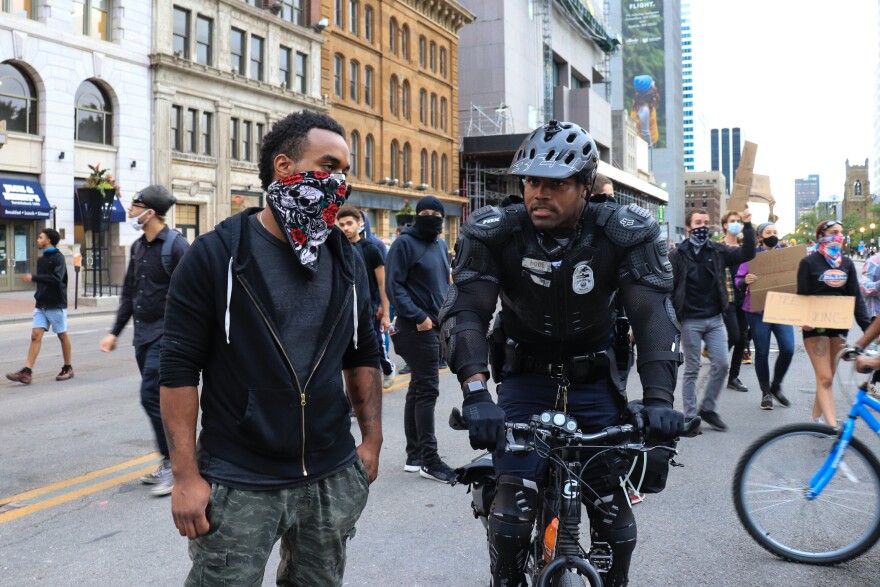Columbus' fifth full day of protests remained , with police walking and even kneeling alongside protesters, until just after curfew when officers met demonstrators with pepper spray on the Ohio State campus.
On Monday night, hundreds of protesters gathered in front of the Ohio Statehouse in downtown Columbus to honor George Floyd, an African American man by a white Minneapolis Police officer last week. The protesters laid face-down on the ground, arms clapsed behind their backs, chanting, “I can’t breathe."
Hundreds of protestors lay flat on the ground at the Ohio Statehouse in Columbus. They chant, “I can’t breathe.”
— Paige Southwick Pfleger (@PaigePfleger)
It looked as though tensions were rising between the crowd and the Ohio Highway Patrol guarding the Statehouse, as a group of officers in riot gear spilled onto the steps. One of the protest's leaders, who was allowed on the steps of the building, asked everyone to take several steps back, urging people to be peaceful.
Protesters knelt on the ground and chanted, “Take a knee," and the crowd erupted in cheers as the officers did just that. “This is what I came for, now I can go home," one participant in the crowd said.
The protest then departed the Statehouse grounds, marching northward on High Street. A group of Columbus Police officers, including Chief Tom Quinlan, were at the intersection of High and Nationwide Boulevard.
There, officers peacefully moved within the crowd, talking with protesters. One man lifted his shirt to show an officer where he had been hit with a wooden bullet the night before.

“Both sides are taking a calmer approach to listen to each other,” said Quinlin. “We need to listen to the public, and the public also has an interest to listen to what the police say because both sides have needs and concerns on how we can provide for a safe community."
Protests the days prior have ended with crowds being tear gassed, maced, or fired on with wooden bullets. On Saturday, Columbus City Council president Shannon Hardin and Rep. Joyce Beatty (D-Ohio) were sprayed with mace by police while trying to de-escalate a conflict.
“I accept full responsibility for the engagement and the tactics used by the Division of Police on Saturday,” said Mayor Andrew Ginther at a press conference before Monday's meeting. “They did not meet my or the community’s expectations. I had a very direct conversation with the chief on Sunday morning and I think you and many others that have been down there have seen a very, very different approach.”
Monday night, Columbus Council passed a declaring racism a public health crisis. Hardin and other members called on Quinlan to immediately change tactics with protesters, and said they would support longer-term reforms like a Civilian Review Commission.
Quinlin says Columbus Police will admit what officers got wrong during the protests, and officers would be disciplined.
“There’s been mistakes made, absolutely," Quinlan said. "This was a fluid situation that every large city in the country is dealing with. And have police agencies gotten it wrong as they’re trying to figure out what the threats are that they’re facing? Of course.”

While protests in downtown Columbus and the Short North dispersed peacefully by the city's 10 p.m. curfew, a group of protesters clashed with police at the corner of High Street and Lane Avenue near Ohio State University's campus.
Columbus' curfew, which Ginther , exempts members of the media. Despite that, members of the Ohio State student newspaper, The Lantern, were pepper sprayed after identifying themselves as journalists.
"Leave or you're going to jail," a Columbus Police officer was recorded telling Lantern staffers. "We're members of the press," the reporters answer. "I don't care, leave," the officer responds.
to Lantern editor-in-chief Sam Raudins, more officers then gathered around the reporters and shoved them, before pepper spraying the reporters in the face.
Columbus Police began spraying protestors around 10:25 at the corner of High and Lane. and I were also sprayed despite making them aware we are members of . The press is exempt from the curfew.
— Maeve Walsh (@maevewalsh27)
When ĐÇżŐÎŢĎŢ´«Ă˝ reporters arrived at the intersection, Columbus Police officers in riot gear were standing at the corner. One person was handcuffed and on the ground.
“You have to go one block down. If I tell you again, I’m going to hose you,” an officer told ĐÇżŐÎŢĎŢ´«Ă˝ reporters, who identified themselves as members of the media.
One officer followed ĐÇżŐÎŢĎŢ´«Ă˝â€™s reporters part way down the block, with a can of pepper spray raised.
We are on Ohio state’s campus. Despite being members of the media officers threatened to pepper spray us.
— Paige Southwick Pfleger (@PaigePfleger)
On Tuesday morning, Columbus Council president pro tem Elizabeth Brown sent a letter to Quinlan regarding Columbus Police's interactions with members of the media. "I am requesting a clear response from you on how your officers will affirm the freedom of the press 24 hours a day," Brown wrote. "The U.S. Constitution is not subject to a curfew."
Freedom of the press is not subject to a curfew.
— Elizabeth Brown (@lizforus)
Last night we saw reported use of force by police against press near OSU’s campus. Today I asked Chief Quinlan for his plan to affirm the freedom of the press 24 hours a day.





